Aloo gosht is a traditional Pakistani dish of mutton with potatoes. Rich, hearty and comforting, this dish works really well in cooler months but in Pakistan, we enjoy it all year around. Here I have shared the recipe of a slow-cooked version that I adapted from my grandmother.
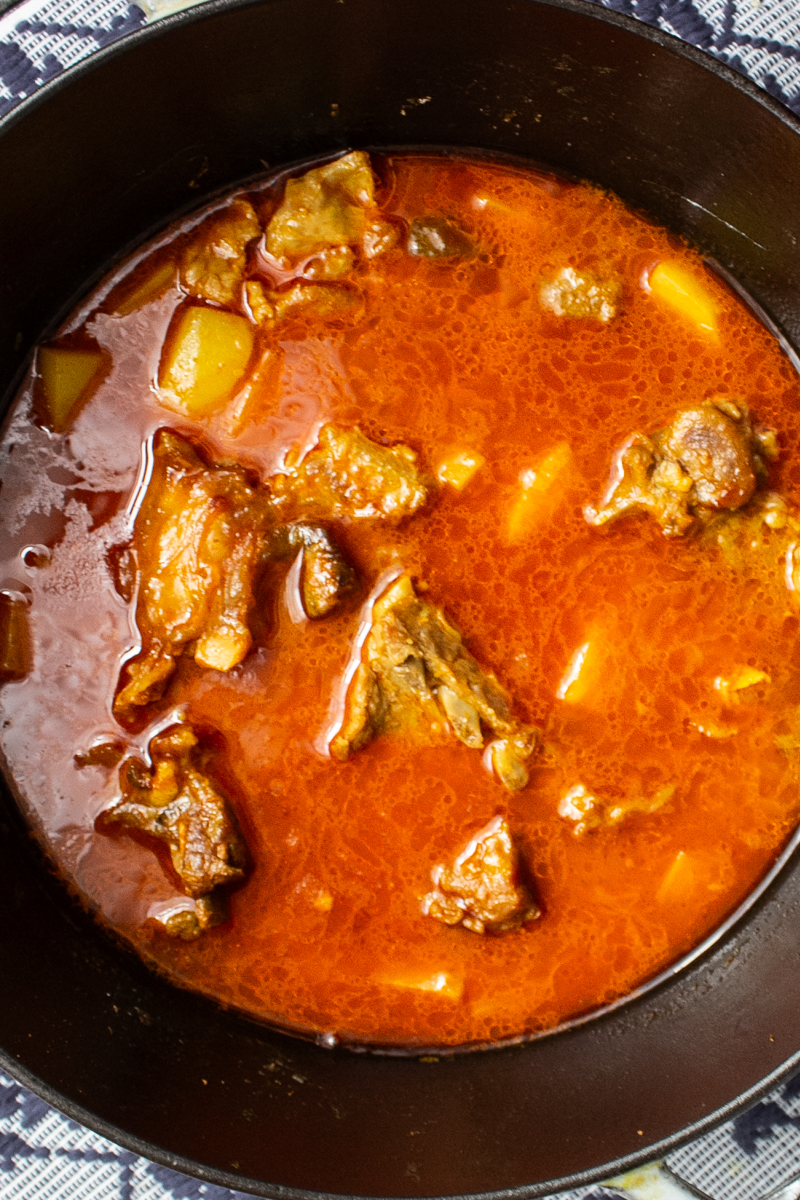
Jump to:
About this Recipe
Punjabis will find a way to pair mutton with anything - greens, cauliflower, turnips, okra, green beans, lentils, taro, flowers – and the beauty of mutton is that it always works. It has the rare ability of absorbing other ingredients in a one-pot dish, letting them shine while still maintaining its own signature taste.
Aloo gosht or mutton with potatoes however, is one of the most popular goat curries in Pakistan. Potatoes are widely available, and in season all year long. Like in many Punjabi households, this dish was a staple in my home. Compared to the other two mutton curries on the blog, aloo gosht has ample gravy, which makes it reminiscent of a heartwarming stew - perfect for fall and winter.
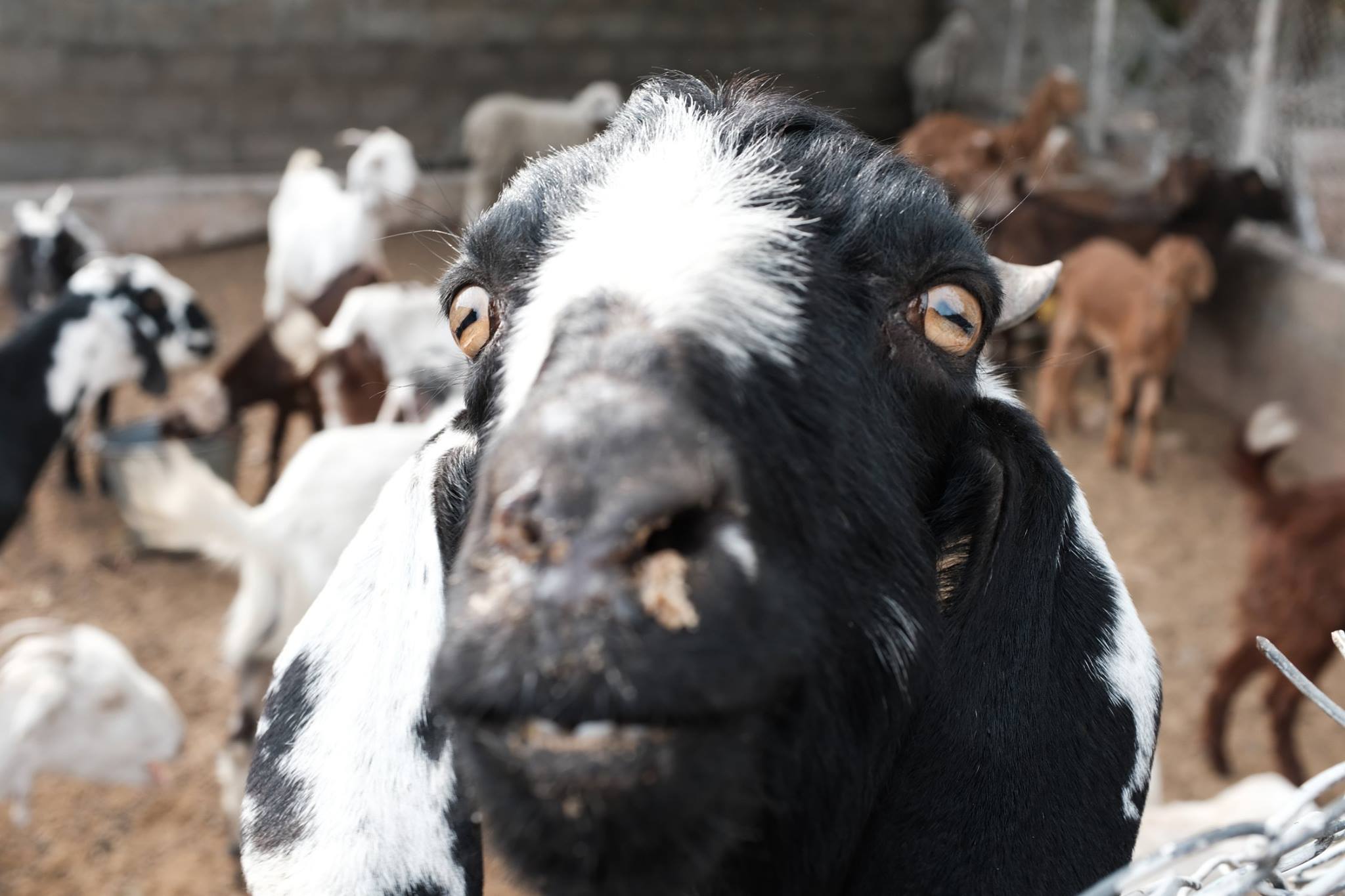
A Note on Mutton
In the context of this blog, when I refer to mutton, I normally mean goat meat. But if you are struggling to source goat where you live, lamb works as well. Goat is high-protein and low-fat but many are intimidated by it because it’s tough, and to some, gamey. While in Pakistan, it’s more affordable than beef, in the US, it can be difficult and expensive to source it. But if you find a neighborhood Caribbean or South Asian grocery store that carries high-quality goat meat, I would urge you to give it a try.
How do you know if it’s high-quality goat meat? It’s a process of trial and error, and getting to know your vendor or butcher. It helps when you can select the cut. In Pakistan, chest is premier but shoulder also does the trick. In Manila, while I was able to source my choice of cut cheaply from the “halal butcher guy,” the meat was routinely tough because he was serving older goats. I sound like a Disney villain for saying this out loud but you want them young! For mid-quality goat meat, it can take 60 to 90 minutes to tenderize the meat. If it’s a younger goat, it decreases to 30 to 45 minutes. But even if the cooking process takes time, the recipes themselves are quite straightforward. Master one, and you are ready to tackle the rest.
Ingredients
Neutral oil: I used canola oil for this recipe but sunflower or vegetable oil works well too.
Yellow onion: Opt for a medium-sized yellow sized onion and make sure you halve and slice it very thinly.
Crushed ginger: You can make this at home by pulsing fresh ginger in a food processor or with a mortar and pestle. Store bought is also fine.
Crushed garlic: You can make this at home by pulsing peeled garlic cloves in a food processor or with a mortar and pestle. Store bought is also fine.
Bird’s eye chile: In Pakistan, we frequently use green bird’s eye chile but you can use any fresh chile that’s locally available. In the US, I prefer to use serrano chiles.
Goat or lamb meat: We traditionally use bone-in goat meat for this dish but you can also prepare it with lamb. I like to ask for shoulder cut but a mixed cut works too – just remember to ask the butcher to cut it, bone-in, in 1 ½ to 2-inch pieces.
Salt: I prefer to use rock or sea salt, and find that layering salt at different stages works best to make sure the curry is properly well-seasoned.
Cumin powder: A pantry essential, it will infuse the dish with earthy and nutty notes.
Coriander powder: Its floral and citrus notes are a nice complement to cumin.
Turmeric powder: A bright yellow spice, this will give aloo gosht that warm, golden color.
Red chili powder: For Pakistani recipes, I like to use Kashmiri red chili powder (available at all South Asian grocery stores) due to its vibrant red color. But you can also substitute with ground cayenne red pepper and a dash of paprika for color. Cayenne red pepper is slightly hotter so adjust the heat based on your personal preference.
Yukon gold potatoes: This is my preferred variety of potatoes for Pakistani recipes but a russet potato also works just fine.
Garam masala powder (optional): You can dust the dish with garam masala powder towards the end for a smoky and warm finish.
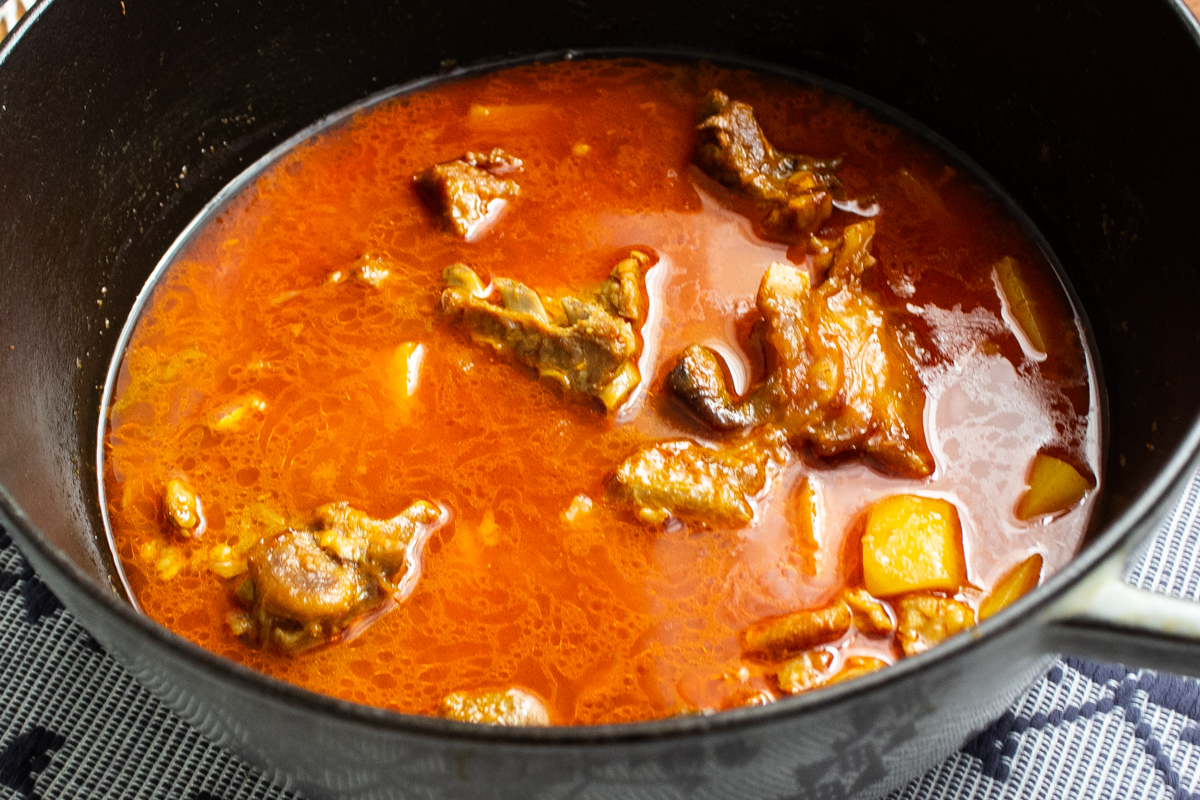
How To Make It
The most time consuming part of the recipe is letting first, the mutton tenderize (which varies significantly based on the quality of the mutton), and then, the potatoes. The prep time however, is minimal; and the steps fairly straightforward to follow.
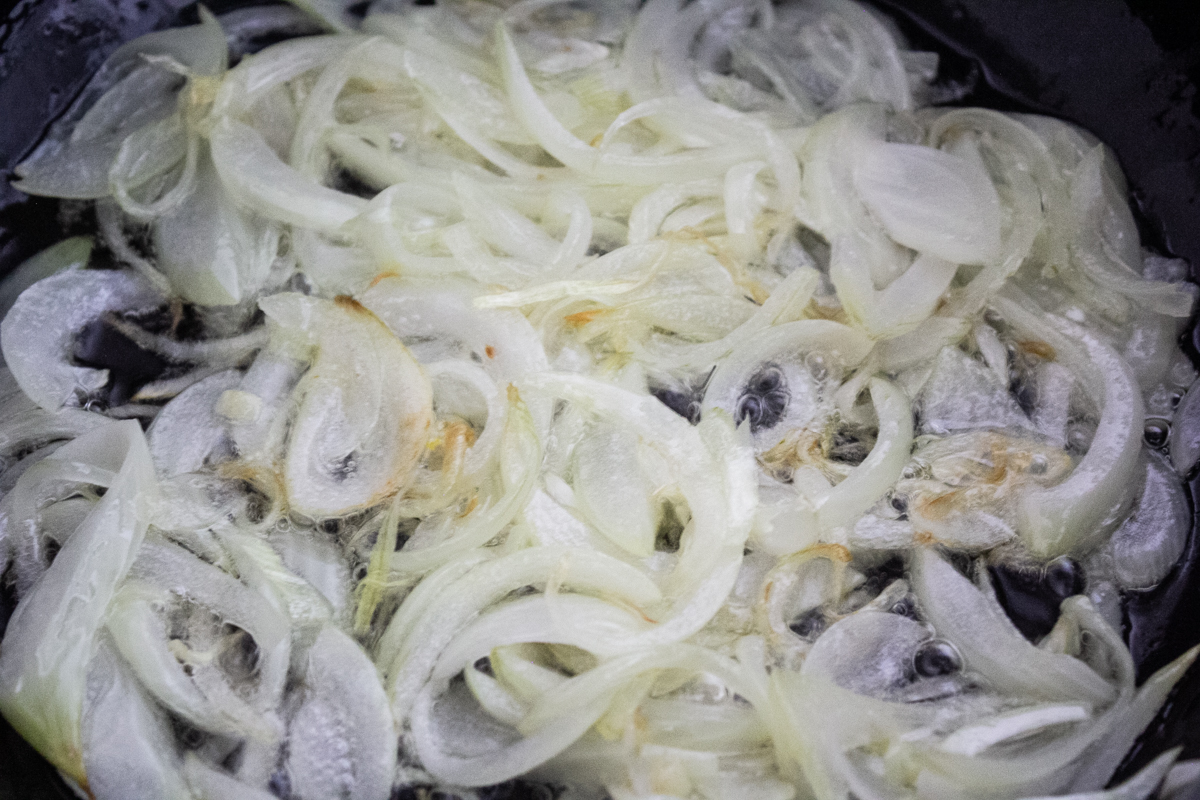
In a heavy-bottomed pot, heat oil over medium-low heat until it begins to shimmer. Add the sliced onion and fry until translucent, about 5 to 7 minutes.
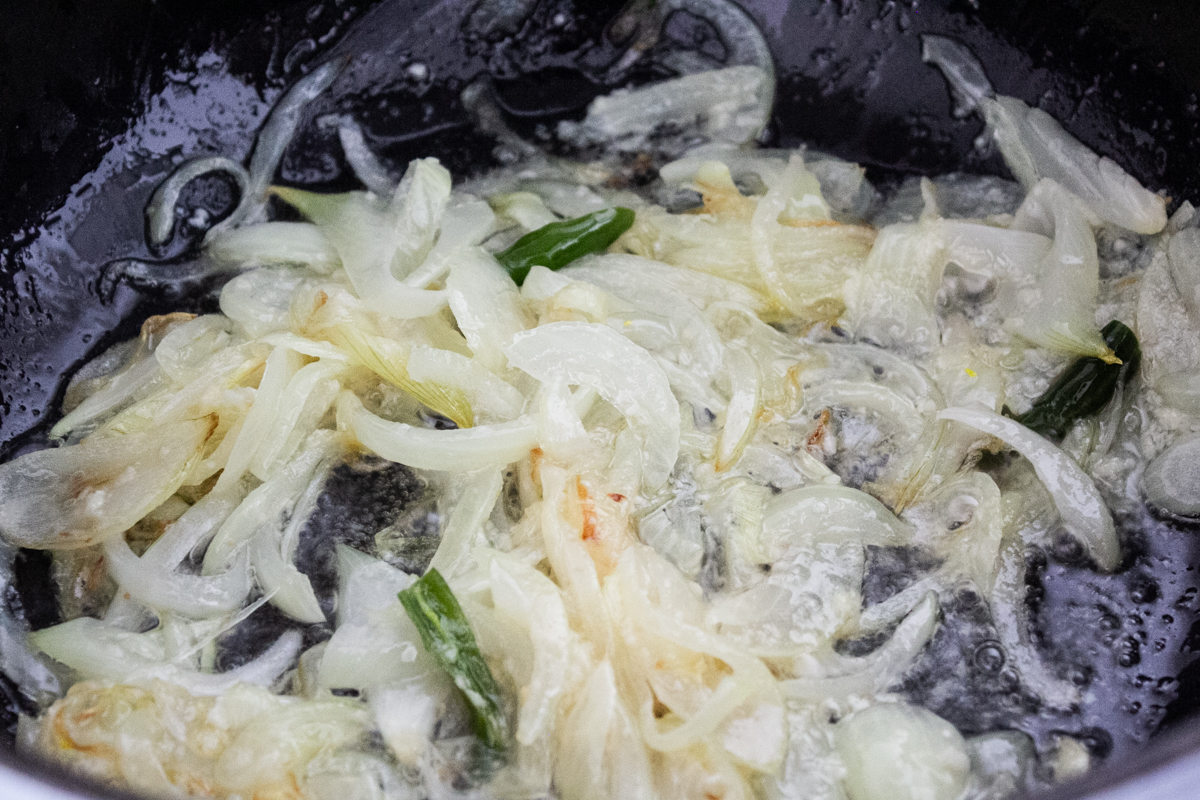
Add crushed garlic, ginger and fried chiles, and stir continuously until they stop smelling raw.
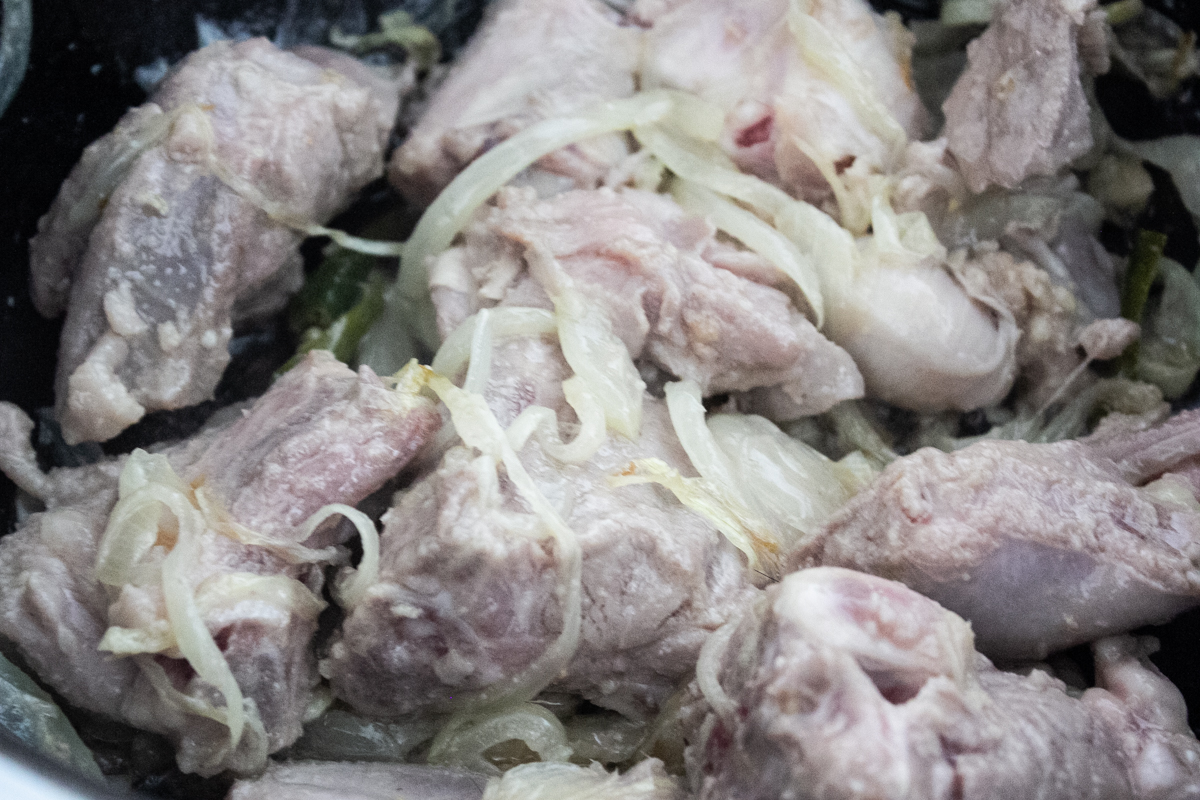
Increase heat to medium, and fold in the mutton and half of the salt. Fry until evenly browned, about 5 minutes.
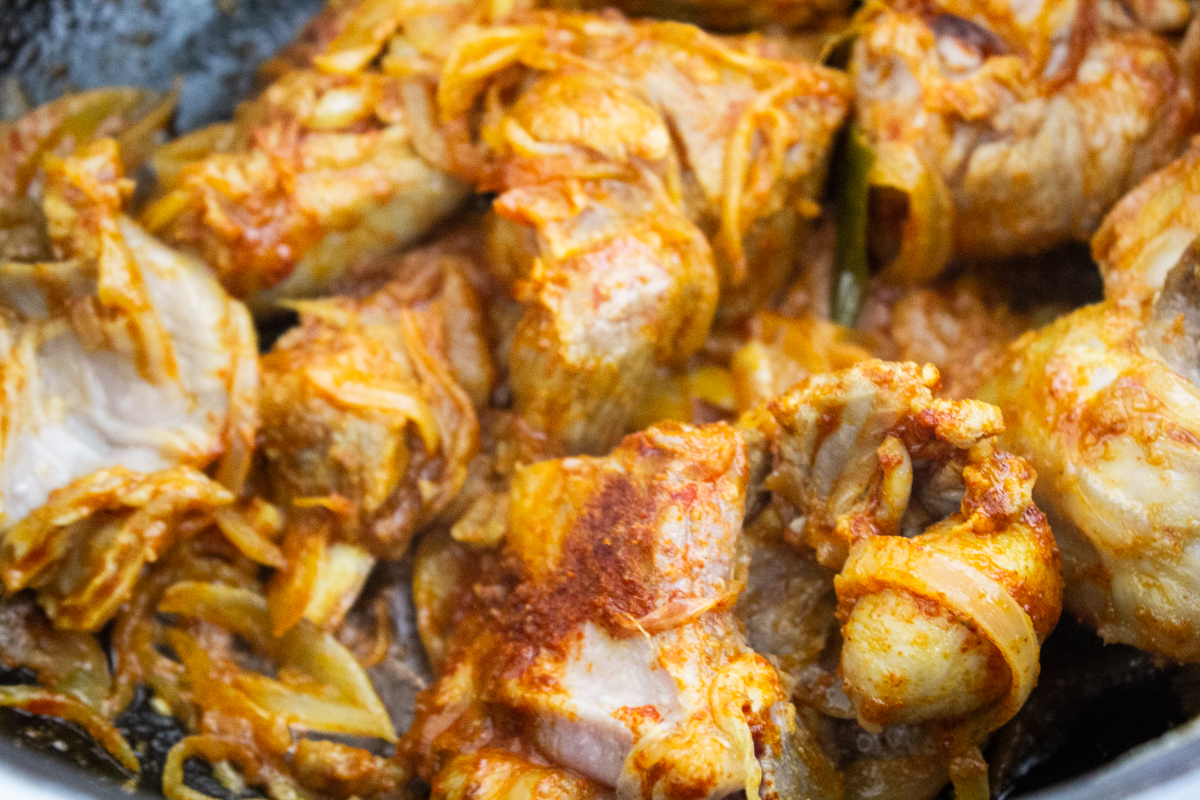
Add the ground spices, and stir until well-mixed. Pour 1 to 1 ½ cups of water until the mutton is covered ⅓rd of the way. Bring to a gentle simmer and cover with a tight-fitting lid. Let the mutton cook on medium-low heat until tender, about 1 to 1 ½ hour. Add water, ¼ cup at a time, if it’s getting too dry, and stir occasionally to make sure the meat doesn’t stick to the pan.
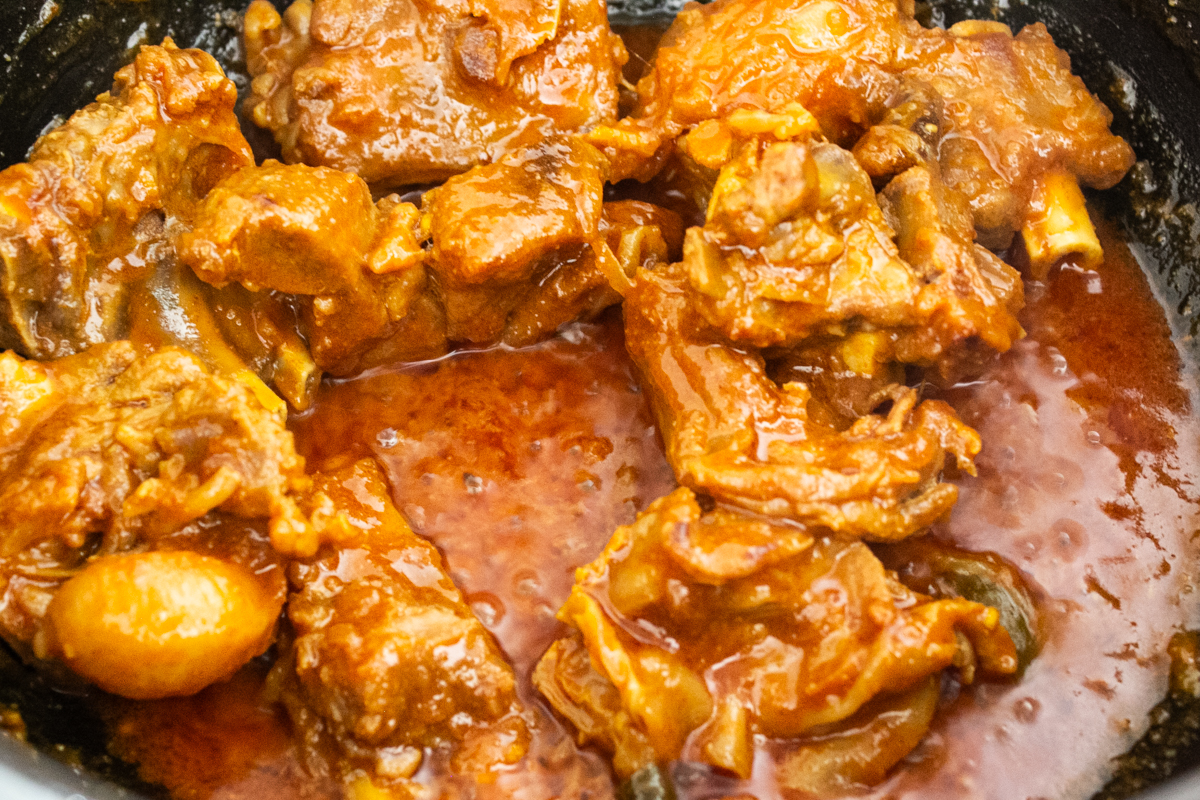
Once the mutton is tender, remove lid and increase heat to high to boil out excess water. Stir until the oil begins to separate from the masala.
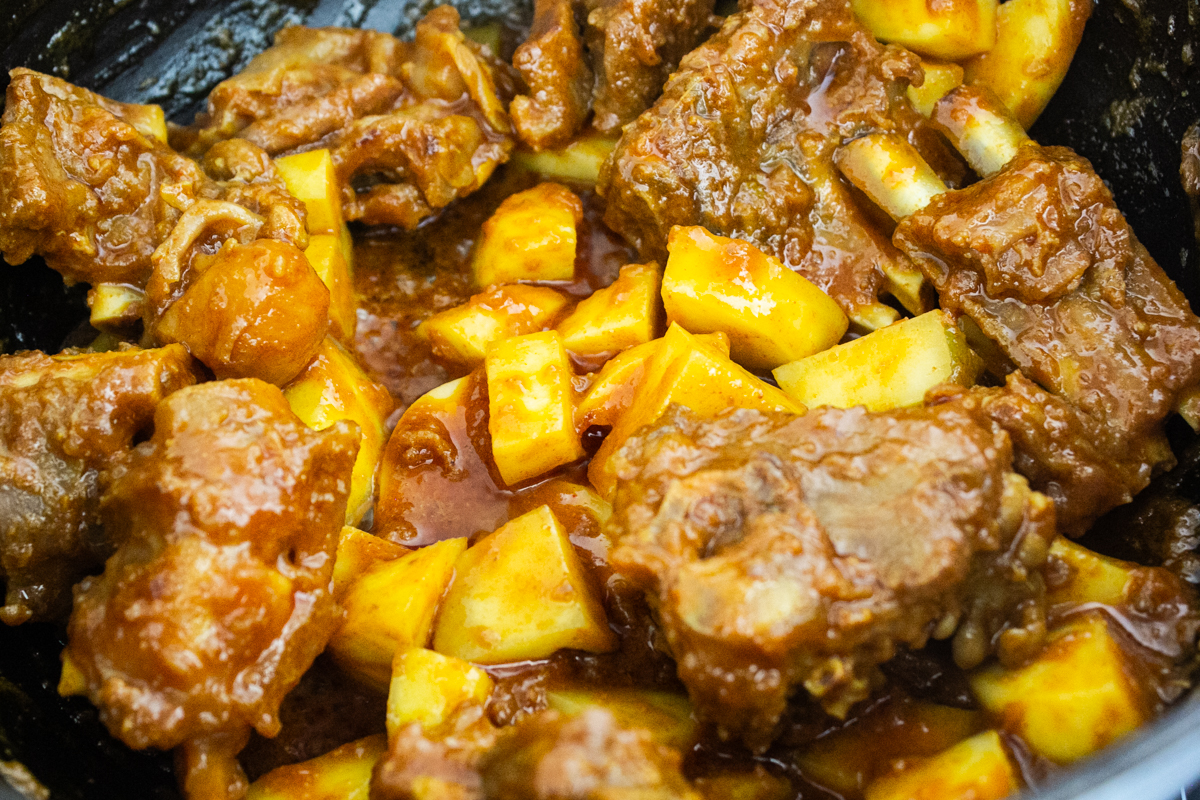
Fold in the chopped potatoes, remaining salt and fry on medium heat, stirring frequently, to make sure they are well-coated in the masala.
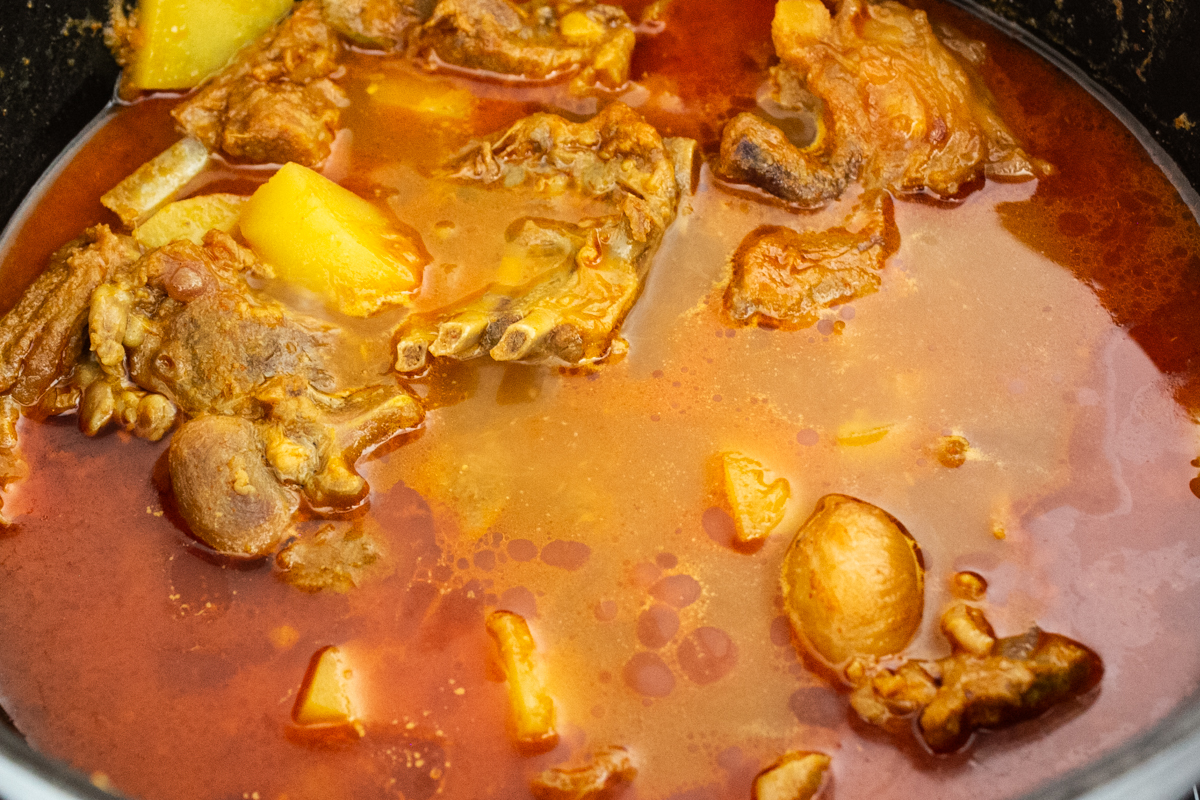
Add 2 cups of water and bring to a gentle simmer. Lower heat to medium-low and cover with a tight-fitting lid. Let the aloo gosht cook until the potatoes break easily with a fork, 20 to 30 minutes. Remove from heat and transfer to serving dish. Dust with garam masala powder (if using) for a smoky finish.
Tried this recipe? If you tried this recipe, please leave a comment telling me how it was! Constructive feedback is always welcome. If enjoyed the recipe, do consider leaving a starred review and tagging me on Instagram so I can see your creations! It always makes my day.
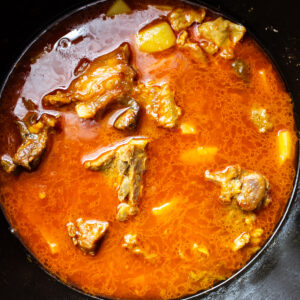
Pakistani Style Classic Aloo Gosht (Mutton with Potatoes) Recipe
Equipment
- 1 Heavy-bottomed pot
Ingredients
- 1 medium-sized yellow onion halved and thinly sliced
- 1 ½ teaspoon crushed garlic
- 1 ½ teaspoon crushed ginger
- 2 bird's eye chiles
- 500 grams (1 pound and 1 ounce) mutton, cut in 1 ½ to 2-inch pieces
- 1 ¼ teaspoon salt halved
- 2 teaspoon Kashmiri red chili powder
- ¼ teaspoon turmeric powder
- 2 teaspoon coriander powder
- 1 teaspoon cumin powder
- 350 grams (about 12 ounces) Yukon gold potatoes peeled, halved and sliced in 1 ½ to 2-inch pieces
Instructions
- Heat oil over medium-low heat in a heavy bottomed-pot until it begins to shimmer. Add onions and fry until translucent, about 5 to 7 minutes.
- Add crushed garlic and ginger, and bird's eye chiles. Stir until they stop smelling raw, about 1 minute.
- Increase heat to medium-high, and fold in the mutton and half of the salt. Fry until evenly browned, about 5 minutes.
- Add red chili, turmeric, coriander and cumin powder, and stir until the mutton is well-coated in the spices. Keep stirring until the oil begins to separate from the masala. Add a splash of water to deglaze the pan if needed.
- Add 1 to 1 ½ cups of water until the mutton is covered ⅓rd of the way. Bring to a gentle simmer and cover with a tight-fitting lid. Let the mutton cook on medium-low heat until tender, about 1 to 1 ½ hour (it will depend on the quality of the meat). Add water, ¼ cup at a time, if it’s getting too dry, stirring occasionally to make sure the meat is not sticking to the pot.
- Once the meat breaks easily with a fork, remove lid and bring heat to medium-high to boil out excess water. Stir frequently until the oil separates from the spices.
- Fold in the chopped potatoes and stir until well-mixed with the rest of the ingredients.
- Add 2 cups of water and bring to a gentle simmer. Lower heat to medium-low and cover with a tight-fitting lid. Let the curry cook until the potatoes break easily with a fork, 20 to 30 minutes. Check for salt and adjust as needed. Remove from heat and transfer to serving dish. Dust with garam masala powder (if using).

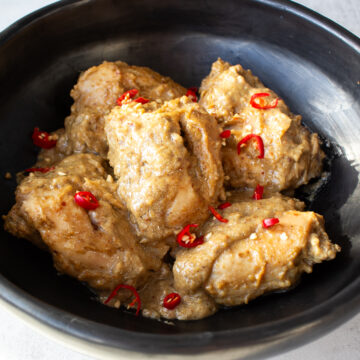
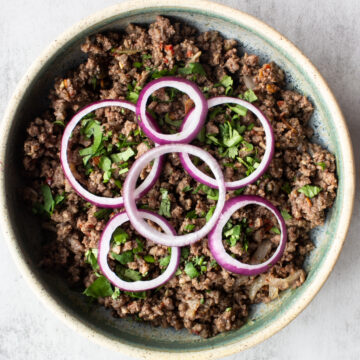
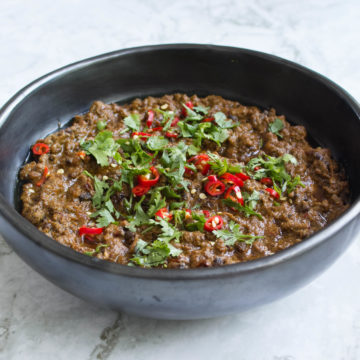
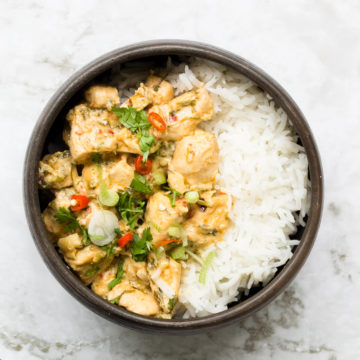
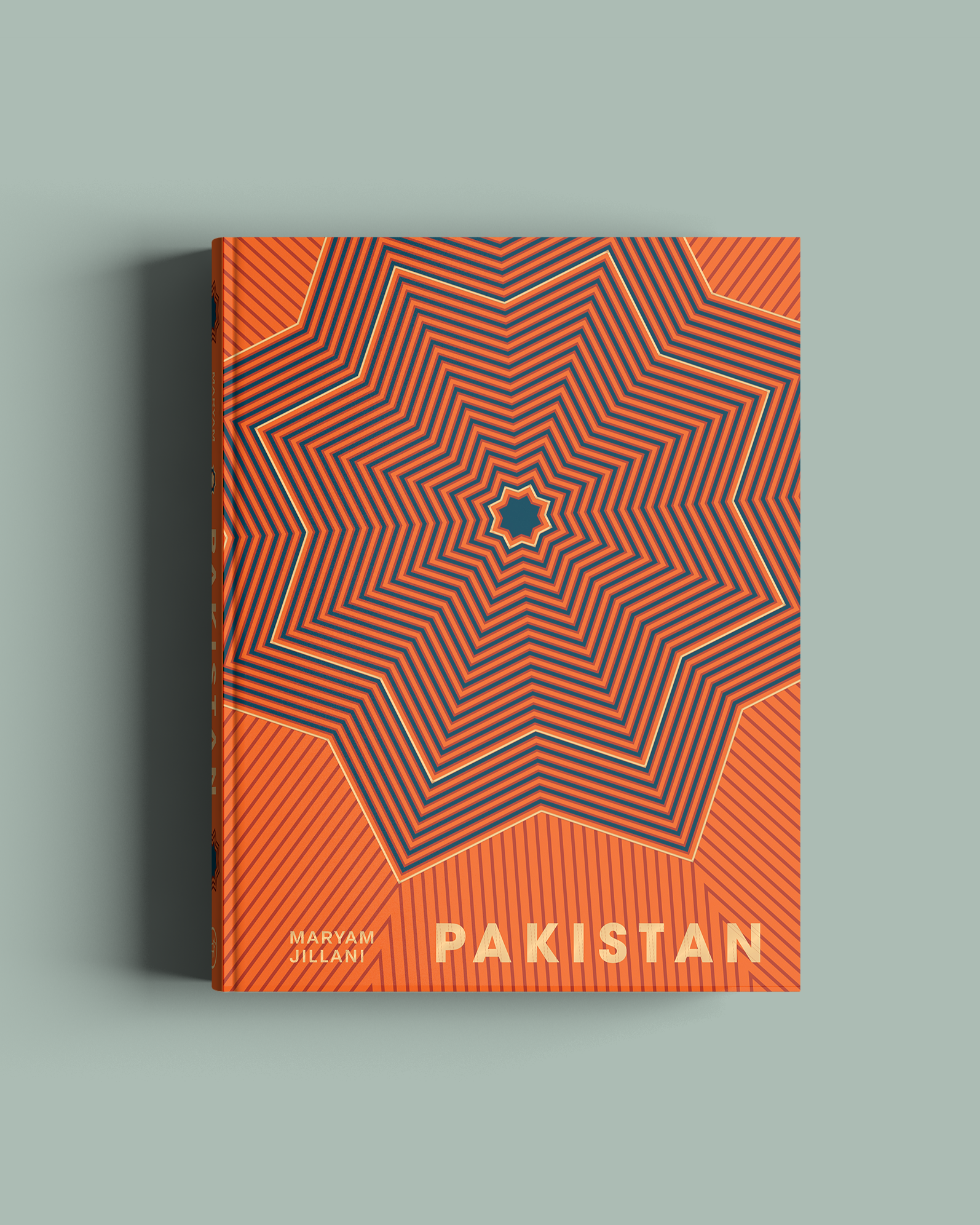
Leave a Reply